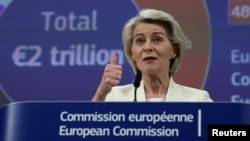The European Commission has put forward its vision for the next long-term (2028-2034) European Union budget -- a record-high 2-trillion-euro ($2.3 trillion) framework, with a doubling of funds for both Ukraine and EU foreign policy in general, and a fivefold increase in defense-related investment.
It is worth remembering that the July 16 proposal is just the opening shot in a battle that will consume Brussels for the next two years.
All 27 EU member states, which provide the vast majority of the cash through national contributions linked to their gross national income (GNI), must approve the proposal.
But this is not likely to happen until what is expected to be marathon, last-minute negotiations in the latter half of 2027.
So don’t count on the budget remaining at 2 trillion euros by then -- or on Ukraine, foreign policy, and enlargement policy getting as much financial support as the European Commission presented on July 16.
Most of the net contributors -- in other words, those who pay more into the common budget than they receive back -- are mainly richer northern member states such as Germany, the Netherlands, and Sweden, and they aren’t keen to increase the budget at all.
The commission proposal is already a 600-billion-euro ($700 billion) jump compared to the 2021-2027 budget.
Fuel For Euroskeptics
And with several countries grappling with low growth, ballooning deficits, and budget cuts, the idea of the EU expanding its coffers right now could be useful ammunition for Euroskeptic parties railing against Brussels across the continent.
To appease member states on this, the European Commission is proposing two things.
First, new “own resources” so that the budget isn’t so dependent on member state contributions. Some of the new ideas include a tobacco tax and levies on large corporations.
Few think this will succeed or have much impact.
So instead, the second thing that the commission proposes is to send most of the cash back to member states in the shape of support for farmers, fishermen, and poorer regions of the bloc. This is already the biggest section of the budget at the moment -- worth a total of 865 billion euro ($1 trillion) of the 2-trillion-euro proposal.
It probably won’t shrink.
More Defense Spending?
Interestingly, there is now a proposal to allocate 131 billion euro ($152 billion) for defense, which would be a fivefold increase compared to the current level.
Several member states, notably Denmark and France, have indicated that the EU must become more of a military player, especially as the United States might dedicate fewer military resources to the continent in the coming years.
If the proposal is not watered down, this would signal real intent on the issue.
So, what about the foreign policy aspects of the commission’s plan?
It’s all grouped under the heading “A Stronger Europe in the World” and totals €200 billion ($233 billion).
This is a doubling of the previous budget and contains everything from humanitarian aid, various foreign missions the bloc has -- such as a monitoring mission in Armenia -- to pre-accession funds for EU candidate countries in the Western Balkans and the bloc’s eastern neighborhood.
The money proposed for pre-accession is around 40 billion euros ($46 billion), an increase from before, but there is still no breakdown of how much cash each country will get.
What is interesting, however, is that there is a revision clause in the proposal which means that the budget will be reworked if a country joins the club during the 2028-2034 period.
After all, members tend to get more money than candidate countries. And given that nations like Albania, Montenegro, and possibly even Moldova could join within this time frame, they stand to gain even more.
What About Ukraine?
It is worth remembering here that Ukraine has been given a separate heading altogether.
While Kyiv, of course, can benefit from the 200 billion euro of accession and humanitarian cash, European Commission President Ursula von der Leyen has promised a dedicated 100-billion-euro ($116 billion) pot for the reconstruction of the war-torn country.
Between 2024 and 2027, this so-called “Ukraine facility” amounts to €50 billion ($58 billion) in loans and grants, financed through common EU borrowing, which all member states guarantee to repay.
The question is whether a country like Hungary, which has been skeptical about all things Ukraine in recent years, will agree to this -- especially as von der Leyen announced that rule of law conditionality applies to all the funds in the new budget.
This conditionality existed to a certain degree in the previous budget and allowed Brussels to freeze billions heading to Budapest.
Watering down conditionality in order to get more money for Ukraine already seems like one of the many compromises that will now have to be struck for this budget to eventually go through.












